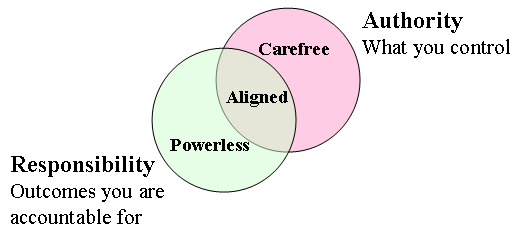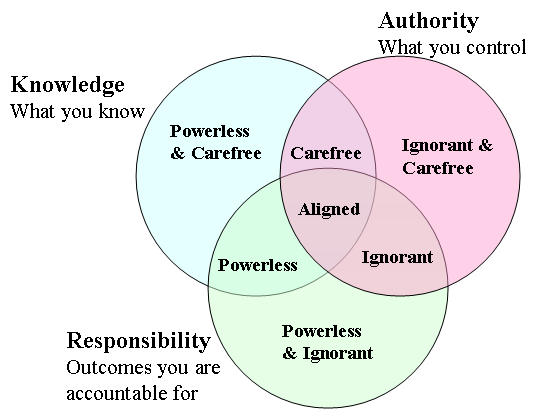|
Integrity Zone
Aligning Responsibility, Authority, and Information
|
Hans is a sincere person who works hard to maintain his integrity, do the right
thing, and contribute constructively at work, at home, and to the greater
community. Unfortunately, now he is under constant stress caused by conflict at
work. It seems his boss is not acting in the best interests of the organization.
Here are Hans's thoughts as he analyzes the situation: Hans took a closer look
at responsibility, authority and knowledge and how they interacted with each
other. He understood responsibility, which was his ability to respond to meet
his obligations and duties to do his job and satisfy his customers. When he ran
the organization himself he lived by the consequences of his actions. If his
products sold well, he was satisfied emotionally and financially. If the
products failed, he suffered. He understood knowledge; it was his job mastery
and understanding of customer needs. He had a complete understanding of his work
and continued to learn all the facts, ideas, and principles he could about it.
Hans considered the word “authority”. He used to think of an authority as a
person with expert knowledge and experience in some topic area. Such people were
naturally looked up to and their advice was sought out and followed. Several
people had referred to Hans as an authority in his area of work. He now
understood a new meaning of the word. Authority is the ability or
power to enforce rules or give orders. This form of authority, when power is granted
without expertise, is an empty authority. In the past he had genuine authority
as a result of his expertise and ownership of the business, but now he was
powerless.
to enforce rules or give orders. This form of authority, when power is granted
without expertise, is an empty authority. In the past he had genuine authority
as a result of his expertise and ownership of the business, but now he was
powerless.
He drew a simple diagram to better understand what was happening

The problem seems to begin when authority is separated from
responsibility. This allows people with authority to avoid the responsibly for
their actions. They become carefree and careless. Also, people become powerless
when they are stripped of authority. Accountability requires risk taking to be
aligned with decision making, and here they are being separated.
Authority is power
Responsibility is obligation.
Authority without responsibility is careless and irresponsible.
The problems get worse when you consider the knowledge needed
for making effective decisions. Hans drew this more complete picture.

Hans had been stripped of authority, so he was now powerless.
The people who had authority lacked knowledge, so they were ignorant. They also
seemed to escape responsibility, making them carefree, careless, and
irresponsible.
When authority, knowledge, and responsibility had been aligned
within him, the business had run smoothly. When they were separated, nothing
seemed to go right. In addition, this misalignment seemed to lead to a lack of
integrity throughout the executive team.
Hans began to call this alignment the integrity zone.
The alignment of authority, knowledge and responsibility made it easy to know
what to do and to do the right thing. Staying true to your values when someone
else is in authority may only make you a martyr or a victim, exposing yourself
to torment, distress and suffering with little if any gain.
References
The Empowered Manager: Positive Political Skills at Work ,
by Peter Block ,
by Peter Block
|
Fear, Sadness, Anger, Joy, Surprise, Disgust, Contempt,
Anger, Envy, Jealousy, Fright, Anxiety, Guilt, Shame, Relief, Hope, Sadness, Depression, Happiness,
Pride, Love, Gratitude, Compassion, Aesthetic Experience,
Joy, Distress, Happy-for, Sorry-for, Resentment, Gloating, Pride, Shame, Admiration, Reproach,
Love, Hate, Hope, Fear, Satisfaction, Relief, Fears-confirmed, Disappointment, Gratification,
Gratitude, Anger, Remorse,
power, dominance, stature, relationships |




